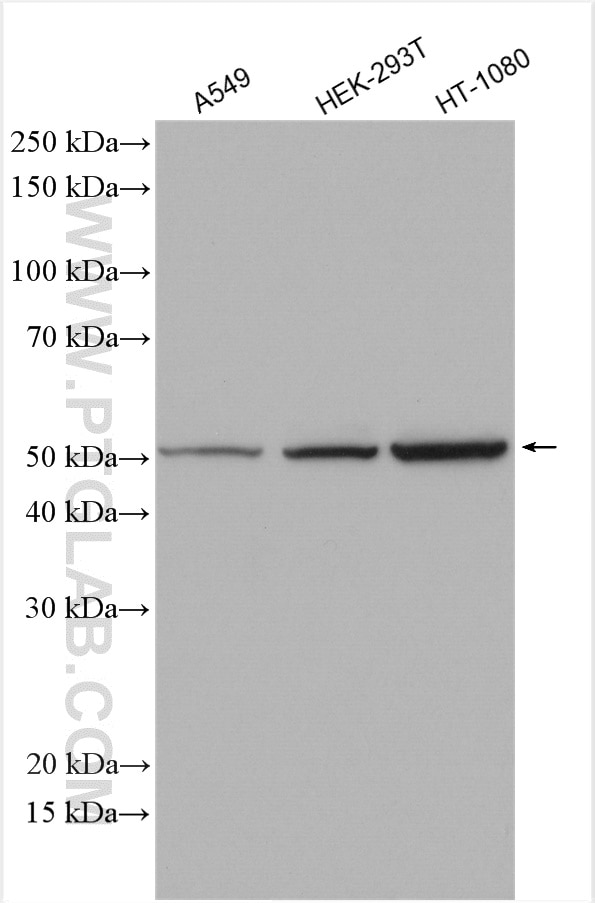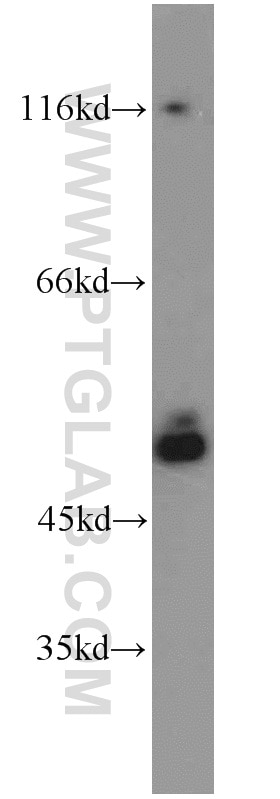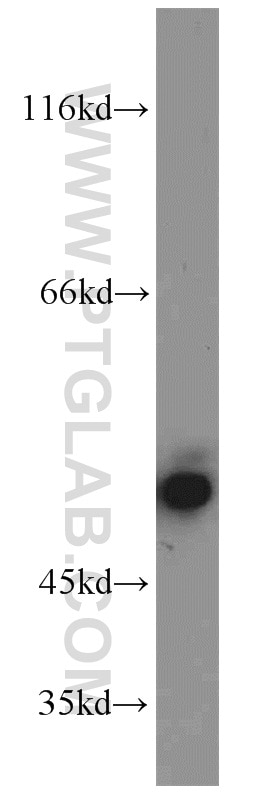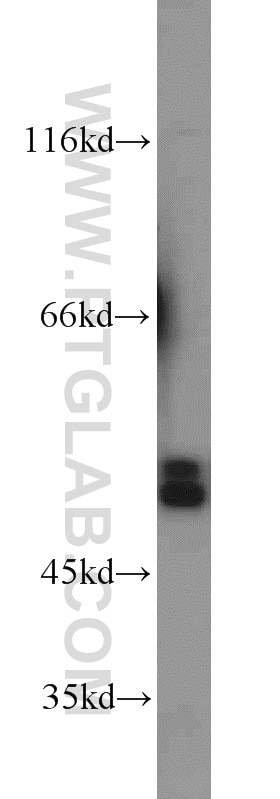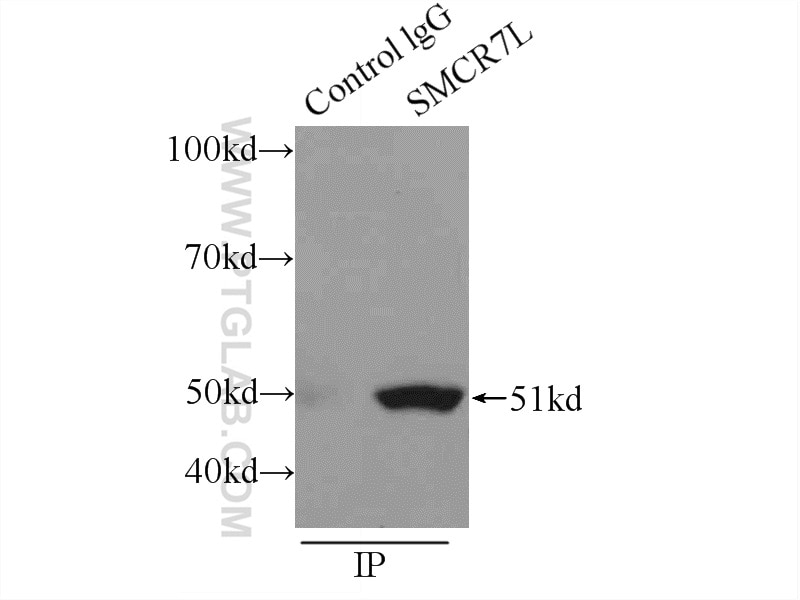- Featured Product
- KD/KO Validated
SMCR7L/MID51 Polyklonaler Antikörper
SMCR7L/MID51 Polyklonal Antikörper für WB, IP, ELISA
Wirt / Isotyp
Kaninchen / IgG
Getestete Reaktivität
human, Maus, Ratte und mehr (2)
Anwendung
WB, IHC, IF, IP, ELISA
Konjugation
Unkonjugiert
Kat-Nr. : 20164-1-AP
Synonyme
Geprüfte Anwendungen
| Erfolgreiche Detektion in WB | A549-Zellen, HEK-293T-Zellen, HT-1080.Zellen, Maushodengewebe, NIH/3T3-Zellen |
| Erfolgreiche IP | RAW 264.7-Zellen |
Empfohlene Verdünnung
| Anwendung | Verdünnung |
|---|---|
| Western Blot (WB) | WB : 1:500-1:2000 |
| Immunpräzipitation (IP) | IP : 0.5-4.0 ug for 1.0-3.0 mg of total protein lysate |
| It is recommended that this reagent should be titrated in each testing system to obtain optimal results. | |
| Sample-dependent, check data in validation data gallery | |
Veröffentlichte Anwendungen
| KD/KO | See 10 publications below |
| WB | See 73 publications below |
| IHC | See 2 publications below |
| IF | See 3 publications below |
| IP | See 2 publications below |
| FC | See 1 publications below |
Produktinformation
20164-1-AP bindet in WB, IHC, IF, IP, ELISA SMCR7L/MID51 und zeigt Reaktivität mit human, Maus, Ratten
| Getestete Reaktivität | human, Maus, Ratte |
| In Publikationen genannte Reaktivität | human, Affe, Hausschwein, Maus, Ratte |
| Wirt / Isotyp | Kaninchen / IgG |
| Klonalität | Polyklonal |
| Typ | Antikörper |
| Immunogen | SMCR7L/MID51 fusion protein Ag13775 |
| Vollständiger Name | Smith-Magenis syndrome chromosome region, candidate 7-like |
| Berechnetes Molekulargewicht | 463 aa, 51 kDa |
| Beobachtetes Molekulargewicht | 48-51 kDa |
| GenBank-Zugangsnummer | BC002587 |
| Gene symbol | SMCR7L |
| Gene ID (NCBI) | 54471 |
| Konjugation | Unkonjugiert |
| Form | Liquid |
| Reinigungsmethode | Antigen-Affinitätsreinigung |
| Lagerungspuffer | PBS with 0.02% sodium azide and 50% glycerol |
| Lagerungsbedingungen | Bei -20°C lagern. Nach dem Versand ein Jahr lang stabil Aliquotieren ist bei -20oC Lagerung nicht notwendig. 20ul Größen enthalten 0,1% BSA. |
Hintergrundinformationen
Human SMCR7L gene encodes, MID51, the mitochondrial dynamic protein of 51 kDa (also called mitochondrial elongation factor 1, MIEF1). MID51 is a single-pass membrane protein anchored to the mitochondrial outer membrane and regulates mitochondrial morphology. Mitochondrial morphology is controlled by two opposing processes: fusion and fission. Elevated MID51 levels induce extensive mitochondrial fusion, whereas depletion of MID51 causes mitochondrial fragmentation. MID51 interacts with and recruits Drp1 to mitochondria, suggesting a critical role of MID51 in regulation of mitochondrial fusion-fission machinery in vertebrates.
Protokolle
| PRODUKTSPEZIFISCHE PROTOKOLLE | |
|---|---|
| WB protocol for SMCR7L/MID51 antibody 20164-1-AP | Protokoll herunterladen |
| IP protocol for SMCR7L/MID51 antibody 20164-1-AP | Protokoll herunterladen |
| STANDARD-PROTOKOLLE | |
|---|---|
| Klicken Sie hier, um unsere Standardprotokolle anzuzeigen |
Publikationen
| Species | Application | Title |
|---|---|---|
Science Golgi-derived PI(4)P-containing vesicles drive late steps of mitochondrial division. | ||
Cell Metab Mitochondrial Dynamics Is Critical for the Full Pluripotency and Embryonic Developmental Potential of Pluripotent Stem Cells. | ||
Nat Cell Biol MIROs and DRP1 drive mitochondrial-derived vesicle biogenesis and promote quality control.
| ||
Mol Cell Triaging of α-helical proteins to the mitochondrial outer membrane by distinct chaperone machinery based on substrate topology | ||
Autophagy Loss of MIEF1/MiD51 confers susceptibility to BAX-mediated cell death and PINK1-PRKN-dependent mitophagy.
| ||
Sci Adv Oligodendroglial glycolytic stress triggers inflammasome activation and neuropathology in Alzheimer's disease. |
